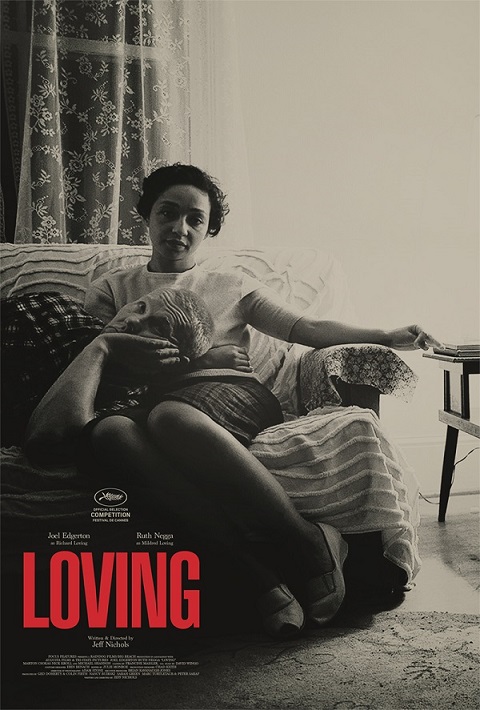HOLLYWOOD—It’s something we shouldn’t forget. Within the living memory laws against miscegenation (interracial marriage) where common place. California’s ban ended with the Perez v. Sharp case in 1948. It wasn’t until 1967’s Loving v. Virginia though that the 16 states still holding out were forced to follow California’s lead. “Loving” tells the tale with superb performances from Joel Edgerton and Ruth Negga. While it drags at times and is curiously short on any courtroom drama, the film does present an aspect of American history we should be mindful of in our times.
The narrative picks up when Mildred Jeter (Ruth Negga) tells her boyfriend Richard Loving (Joel Edgerton) that she’s pregnant. They marry soon after, and in short order are arrested by local Sheriff Brooks (Marton Csokas) for violation of Virginia’s law banning interracial marriage. They are forced to move to the District of Columbia where they’re approached by lawyer Bernie Cohen (Nick Kroll). He offers to take their case pro bono with the full backing of the ACLU. The story mostly centers on the small moments of the Loving’s relationship and their struggle to find happiness together rather than grand portraits of life and race in early sixties America.
The best part of the film is the chemistry between Edgerton and Negga. It’s romantic and tender in a way that is never contrived or exaggerated. There are wonderful moments where they hold hands, kiss, or wrap their arms around each other. Negga was perfect for her role. We can see why Richard would fall in love with her, she’s charming. Her eyes especially convey all her character’s deep emotions, especially her love for Richard. Michael Shannon, oh how I love Michael Shannon, is great in his small part as photojournalist Grey Villet. I’m used to seeing him in in very angry, intense roles, but here he is different. He plays a journalist who masterfully and with compassion captures the Loving’s struggles in a great article/famous photo essay for Life magazine. The rest of the cast ably played their parts, especially Christopher Mann and Terri Abney who play Mildred’s father and sister respectively. I wasn’t as crazy for Kroll as Cohen. He came off sort of smarmy and dispassionate. It wasn’t one of the more memorable performances of a lawyer I can remember. Granted his role was smaller than one might think, but it still left room for greatness that just wasn’t realized.
For a movie about one of the most consequential court cases in United States history there wasn’t much in the way of courtroom theatrics. The movie almost entirely focuses in on Richard and Mildred’s relationship. This can make the narrative slow at points. I realize that director Jeff Nichols was trying to portray the day-to-day struggles the Lovings had to go through just to be together. At times this lead to him reiterating his point, and the 123-minute run time could have been cut 15-20 minutes.
One thing I think will almost certainly be overlooked about this film is what a good journalism movie it is. Villet is a great reporter. He is respectful, unobtrusive, and gets his story with minimal disturbance to the people he is covering. The sad thing is when it’s published, an unidentified co-worker of Richard’s wraps the article around a brick as a threat. It brings up an interesting journalistic ethical quandary, and should remind reporters to make sure the article is necessary (it was) and that their subjects are fully informed of any danger.
Primarily, this is the story of Richard and Mildred’s love, but the key theme outside of that is of course racism. What’s striking here are all the petty humiliations and indignities large and small the Lovings are made to suffer. Richard having to turn his eyes down in deference to the sheriff as he gives a bizarre lecture on blood purity and God creating the races separate is disgusting and depressing. Cohen tells the Lovings that the state of Virginia will dehumanize their children as “bastards” in court as a legal defense. This is not some far off time. It’s terrifying to think that my mother and father were alive when this was happening. Still, there is a lot of hope to be had in this movie. The fact that Attorney General Robert Kennedy got a letter from Mildred and forwarded it to the ACLU for her gives us the knowledge there are politicians who care for the people and can do good deeds simply because they are the right thing to do.
We always need to be reminded of the less than comforting parts of our history. Not just so we don’t forget them or repeat them, but so we can use it to examine ourselves as well. We can see so many parallels for same sex marriage and modern day race relations in this story. The fact that a normal couple like the Lovings could play such a key part in bringing down an entrenched part of systematic racism is enough to give one hope as our country enters dark times once again.






